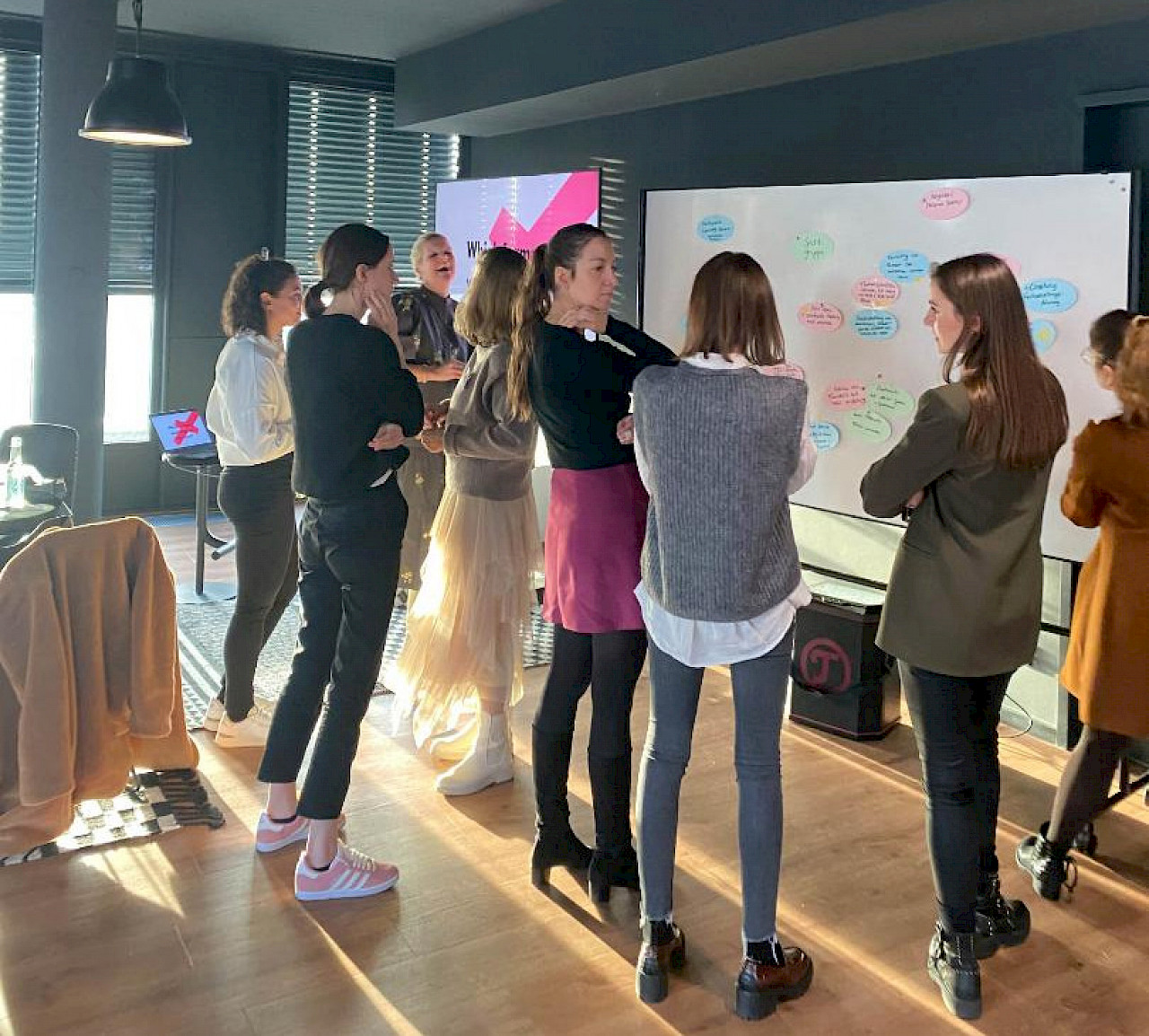
Female founders - facts, challenges and solutions
by xdeck

We foster diversity in entrepreneurship – more and more organizations from the startup scene are taking a stand. Initiatives to promote diversity (e.g., 2hearts), female-led VCs (e.g., Auxxo) and all events that offer female founders a stage (e.g., The Spark) – great first steps to bring fresh air to the male-dominated startup scene.
But how can we really make a difference, measurable, impactful, and for the long run? This is a topic close to our hearts at xdeck. We wanted to understand what really brings added value to female founders. And what's the best way to find out? Simple: Just ask them. We invited 15 inspiring female founders to the SHIP and discussed their difficulties in business, the advantages of mixed founder teams, and what the startup scene has to offer.

We got great insights that we now want to share with you. But first:
What statistics tell us is certainly only part of the whole truth, but it is also a first indication of the differences between female and male founders.
Personality insights
On a personality level, men and women already differ in some of their characteristics.
For example, women are, on average, more empathetic than men. Empathy can stand for positive work experiences as it has been shown to increase productivity, based on a recent analysis by S&P Global (survey of nearly 8,500 companies across 61 countries). What does this tell us with regard to female founders? Empathic leaders create a better working atmosphere and in this way promote the innovative drive and engagement of their employees. Sounds like the odds of success are pretty good for female founders, right?
But on the flip side, what about men? Statistically, men are more narcissistic than women. Even when accounting for differences in age and background. Narcissists, on average, have compelling visions, want to change the world, can easily gain followers, are willing to take risks, change the rules of the game, and make bold decisions (The University of Buffalo condensed 31 years of research on narcissism, involving over 475,000 participants). And that's the point: imagine such traits in an investor pitch, which these days is mostly still judged by men as well. Sounds advantageous. But a narcissist as a leader can also lead to problems. For example, the overall working atmosphere and the personal development of employees can suffer. The ideal solution seems obvious. Combine the best of both worlds in mixed founder teams. Unfortunately, this still does not correspond to the average founder team today.
What else? When it comes to female founders, a problem arises from the difficulty of balancing family and career. Studies show that family responsibilities are still very unequally distributed between women and men. Regardless of gender, founders are on average about 35 years old when starting their venture, so the typical founding phase therefore coincides with the family planning period. Female founders see this as one of the most important problems and expect more political support, for example, in the form of childcare options or maternity/parental arrangements.
Business related insights
Let's talk business. Shocking figure: out of 100 startup founders in 2020, only 11 are female. But you know what the exciting number is? On average, founders in all-female teams create 23 new jobs, while founders in all-male teams create only 17 (Startbase Female Founders Resport 2021). Good for the economy or bad for business?
When it comes to financing their business ideas, female founders face hurdles. Venture capital favors male founders. 7.7% of female teams are backed by business angels, compared to 25.7% of male teams. And 1.6% of female teams use venture capital, compared to 17.6% of men (Female Founders Monitor 2020). One wonders: Why is that? And how can we change it?

Founder scene
What about the startup scene in general? Female founders are most strongly represented in the health, consumer and education sectors. However, they are underrepresented in the important ICT sector. Moreover, female teams generate more than half of their revenue in the consumer market, while male teams clearly dominate in the B2B sector (Female Founders Monitor 2020). And that's also one of the reasons why VC money runs more into male teams, namely because there's been a strong bias towards B2B vs. B2C among investors over the last 10 years. Only part of the explanation, of course, but a very relevant one.
As already mentioned, there are many initiatives and first events that are completely focused on female founder. But we are sure that there is more to come!
By the way, the highest proportion of female founders can be found in Berlin, Cologne and Munich. Berlin has the highest proportion of women among founders, with a share of 12.0%. But Munich and Cologne have an above-average share of female founders in the biotech & medical and nutrition & consumer goods sectors, each with a share of 9.4% (Startbase Female Founders Resport 2021).
Many organizations are already committed to supporting female founders, and that's a good thing! In the meantime, even the first all-female VCs are taking off which is a great direction! But what else can we do? In the discussion with the female founders at xdeck, we were able to take away 3 important key learnings. What do female founders want and need?
1. “We need a stronger network between founders and peer-learning options.”
Mistakes are made far too often. Of course, a culture of mistakes is healthy, moves you forward and is helpful for your personal development. But: The exchange with other founders is a great way to avoid common mistakes and learn more about best practices. After all, everyone has similar problems and questions. When we joined forces with the female founders, we talked a lot with them about peer learning. An exchange with experts is also indispensable, but what is really missing is networking among founders themselves. After all, who knows the challenges of being a founder better than those who have already mastered a founding story themselves? And who better to discuss solutions with than those who have faced the same problems?
2. “We need female role models who inspire us.”
Finding mentors and role models is a challenge. Above all, there are only few female role models to be found in the start-up scene. So, the choice is limited? We're not sure about that. We know many smart and successful female founders who just need to be given a stage to make them even more visible in the scene. What you need is a strong network in which women support each other and share their knowledge. The role model doesn't have to be a serial founder or have scored the biggest deals of the year. Our female founders would like more female support from those who are simply one step ahead in their venture building process.

3. “We need topic-specific events with a good share of women and men.”
Female founders do not want exclusive events for female founders. They want and appreciate the exchange with the other gender, precisely because they have such different characteristics and business ideas. In the best case, events should have an even split, i.e. 50% men and 50% women. This is the only way to learn from the strengths and weaknesses of the opposite gender. In the best case, by the way, these events should be industry- and topic-specific. Because what female founders also want are formats that are thematically more specific and not too broadly based like a lot of existing ones.
So, what do we take from this knowledge? We should become more aware that diversity can be a key factor for success. We should recognize that diversity (and this has many other dimensions besides gender - family background, migration background, study background, work experience, character traits, network etc.) drives us forward, not slows us down. As a first step, let's encourage the next generations of women to found.
Our team at xdeck clearly see two points where we should start.
1. We need to support the so far rare female founders to get ahead in their business. They have to get the same chances to make good contacts and to become successful. Visibility is key. Because they do exist - super successful female founders who are just waiting to act as role models!
2. We need to start with the younger generations. Female role models must pass on their experience to the next generation, and this should already start in schools. Encouraging students, especially female students, to get active and to trust in their strength is the second step towards a more diverse future in the startup ecosystem.
Let's start and jointly make entrepreneurship more diverse!
About the author: Christina Bergmann is Marketing & Ventures Associate at xdeck.
